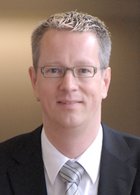Günter M. Ziegler

Director of the Media Office of the German Mathematical Society and deputy chair of the Berlin Mathematical School – Germany
Personal website
Günter M. Ziegler was born in München, Germany, in 1963. He got a Ph.D. at M.I.T. with Anders Björner in 1987. Since 1995 he is a Professor of Mathematics at TU Berlin, a co-chair of the “Berlin Mathematical School", and a member of the DFG Research Center MATHEON.
His interests connect discrete and computational geometry (especially polytopes), algebraic and topological methods in combinatorics, discrete mathematics and the theory of linear and integer programming. He is the author of “Lectures on Polytopes" (Springer-Verlag 1995) and of "Proofs from THE BOOK" (with Martin Aigner, Springer-Verlag 1998), which has by now appeared in 14 languages.
His honors include a “Leibniz Prize" (2001) of the German Science Foundation DFG, the “Chauvenet Prize" (2004) of the Mathematical Association of America, and the 2008 “Communicator Award" of DFG and Stifterverband.
He is a member of the executive board of the Berlin-Brandenburg Academy of Sciences, and a member of the German National Academy of Sciences Leopoldina. 2006-2007 he was the first chair of the “Berlin Mathematical School", a joint Graduate School of the three Berlin mathematics departments, funded in the framework of the German Excellence Initiative.
2006-2008 he was the President of the German Mathematical Society DMV, he initiated and co-organized the German National Science Year “Jahr der Mathematik 2008" and now directs the DMV Media Office and the DMV Network Office “Schools-Universities".
How can mathematics solve problems?
If Mathematics Education at school is the answer, what was the question? What is the primary goal of Mathematics education at schools?
My claim will be that
- it is not one goal but at least three, and
- these goals are moving targets.
To name three primary goals:
- To present Mathematics as a part of our culture, and as a basis for modern key technologies, which presents answers to very basic, very natural questions, history, present, future.
- To present Mathematics as a field that equips everyone with the ability to give answers (himself/herself!) to important problems and questions that occur in daily life.
- To introduce into Mathematics as a field of study -- and to lay the foundations for possible (university or vocational) studies, in the Sciences, Engineering, or Mathematics itself.
All these goals change over time - so in shaping and designing the Mathematics school curricula we must be careful that the questions haven't changed fundamentally by the time our answers are being implemented....
Paper
Download PDF (114kB)
